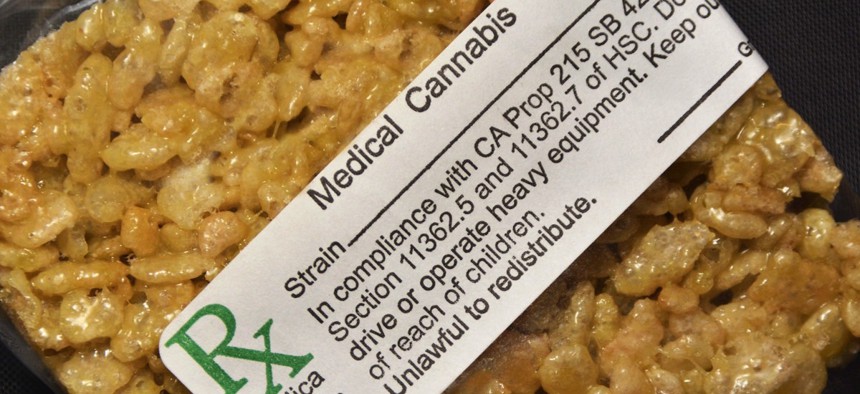Connecting state and local government leaders
Medical patients and recreational users are looking for very different things.
This November, voters in nine states will consider proposals to legalize medical and/or recreational marijuana. The tide has turned, and cannabis is on its way to becoming a legal part of the American landscape—federal law be damned. But experiences in states like Washington and Colorado suggest that without additional regulation, measures meant to make the drug more accessible can wind up hurting the people who need it most.
Marijuana occupies a complex place in the American social and legal landscape in part because of its seemingly contradictory uses. Some people (Snoop Dogg, the Dude) use it to relax and get a buzz. Others use it to treat issues like pain, nausea, glaucoma, and seizures. These two groups are looking for very different things in their marijuana products. For those in the latter group, the last thing they want is a high—they need a drug that will allow them to work, care for their families, and go about their daily business.
This means that medical patients, by and large, are typically looking for drugs with a high cannabidiol (CBD) content and a low tetrahydrocannabinol (THC) profile. CBD appears to have many medical benefits, while THC has less—but THC is what affects your mind and behavior. Many patients also want to take marijuana in doses that are easy to control, which means tinctures, oils, sometimes flowers, and edibles without sweeteners, flavorings, and impurities. Recreational users, by contrast, have an interest in high-THC content, ingested by means including buds, brownies, and everything in between. While pipes, joints, and bongs are used on both sides of the aisle, the chemical profile of the plants involved is often quite different. These distinctions become important when states decide how to implement marijuana policy.
Shango Los, founder of the Vashon Island Marijuana Entrepreneurs Alliance, is a patient advocate who watched the problems with Washington’s rollout firsthand. He reports that it was an unmitigated disaster. Washington’s 2015 Cannabis Patient Protection Act, SB 5052, attempted to collapse the medical and recreational markets into a single stream that would theoretically relicense already legal medical dispensaries and allow them to continue operating under the state’s new banner.
That’s not what happened. Instead, some 2,000 medical marijuana dispensaries across the state shut down on July 1, 2016 under the terms of the law, which required existing businesses to close and enter a lottery for new business licenses. The state issued just 222 new licensesto cannabis businesses—most recreational in nature. The lottery system was designed to give priority to people with experience and a record in the industry by relying on dispensary pay stubs and other business records. But it failed, says Los. Instead, people seeking licenses for recreational stores purchased pay stubs from former dispensary workers, sometimes for thousands of dollars. The result was a major problem for medical patients, who were left with an array of high-THC products packaged in formats they wouldn’t want to use anyway, like sugary-sweet edibles. Consequently, many medical patients turned to the very black market for marijuana that legalization was supposed to wipe out, reaching out to producers they were familiar with in search of the products they needed.
Things went very differently in Colorado, Los says. That’s because when the state approved recreational marijuana in 2012, it retained its medical marijuana framework and treated recreational products as an additional feature. Some facilities in Colorado focus on medical marijuana, others on recreational, others on both—and patients are taxed at a different rate to reflect the medical uses of the drug. In Washington, by contrast, all dispensaries are created equal, but the recreational-oriented nature of new businesses leaves medical patients out in the cold.
Tim Cullen, CEO of the Colorado Harvest Company, which maintains storefronts and cultivates marijuana plants, says his firm grows and processes high-THC and high-CBD strains side by side, packaging them in a variety of formats. The company sells both strains in stores with experienced budtenders capable of matching clients with the right product. He notes considerable crossover between the two groups; the number of medical cards issued has dropped dramatically, he says, with patients and recreational customers alike sampling a variety of strains.
Cullen argues that legalizing marijuana provides a profound benefit to both medical and recreational users in the form of testing: The quality control built into the legalization process means safer and more predictable pot for consumers, but also opens the door to better selective breeding and the refinement of a variety of strains. If the Drug Enforcement Agency (DEA) loosens up on marijuana regulation, he says the climate could get even better: The ability to accurately prescribe dosing on the basis of actual tested science would help patients get the benefit they’re seeking, without unwanted side effects. Current DEA rules classifying marijuana as a controlled substance in the same category as LSD or heroin makes marijuana research difficult to conduct. Earlier in 2016, the DEA denied two petitions to re-designate the drug, but did announce that it was relaxing some restrictions on research.
This tale of two states is about much more than the patients who are struggling to access medical marijuana in Washington. Unclear and erratic regulation creates a precedent for a sloppy, costly rollout in other states too. In Colorado, the thoughtfully coordinated rollout that retained a medical framework—allowing dispensaries to stay open through the change and continue serving patients—stands in contrast to Washington, which attempted to start from scratch, shutting the industry down in order to regulate it as it reopened.
S.E. Smith is a writer based in Northern California. This article was originally published by Quartz.

NEXT STORY: WATCH: Crews Explode Boulders on a Mountain Road in California



